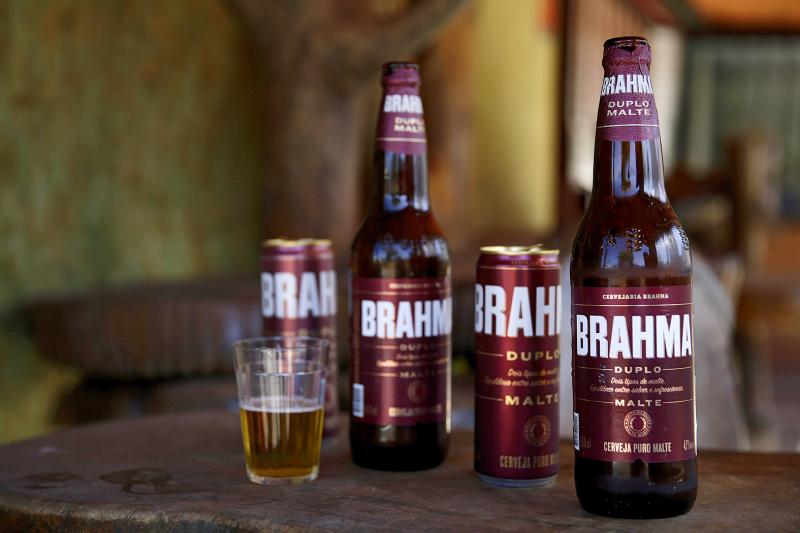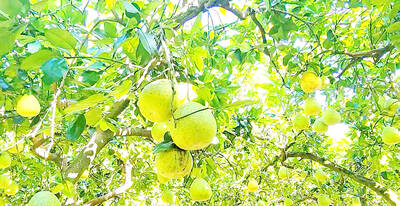An interfaith coalition is pressing the world’s largest brewer to remove the name of a Hindu god from a popular beer that dates to the late 1800s — a dispute the beermaker insists is a case of mistaken identity.
The group, which includes representatives of the Christian, Jewish, Buddhist, Hindu and Jain religions, is calling on Belgium-based brewing giant Anheuser-Busch InBev SA/NV to rename its Brahma line, a favorite in Brazil.
Brahma was first produced in 1888 by Companhia Cervejaria Brahma, a Brazilian brewery now owned by Anheuser-Busch InBev, whose massive lineup of 500 brands includes Budweiser, Bud Light, Corona and Stella Artois. Beers sold under the Brahma name include a lager, a double malt, a wheat beer and a chocolate stout.

Warning: Excessive consumption of alcohol can damage your health.
Photo: AP
“It is the right time to fix an old wrong — the trivializing of the faith of our Hindu brothers and sisters for about 132 years,” coalition spokesperson Rajan Zed said on Tuesday.
Lord Brahma, the god of creation in Hinduism, is a highly revered figure who should be worshiped in temples or home shrines, “not misused as a ‘toasting tool,’” Zed said.
He said the coalition also objects to what it calls “raunchy” marketing of the brand by using the image of a scantily clad woman to promote the beers.
“Anheuser-Busch InBev should not be in the business of religious appropriation, sacrilege and ridiculing entire communities,” the coalition said in a statement, calling on the company to “prove that it cares about communities by renaming its Brahma beer.”
But Lucas Rossi, head of communications for Anheuser-Busch InBev’s Latin America subsidiary, said Tuesday the beers were named in tribute to Joseph Bramah — an Englishman who invented the draft pump valve — and not for the Hindu deity. The spelling was changed, he said, to make the name work better in the Portuguese language.
“We deeply respect religions for sure,” Rossi said in a telephone interview. Hindus are a tiny minority in Brazil, where the Brahma brand is “very important to the culture of the country,” he said.
Zed, who is based in Nevada and is the president of the Universal Society of Hinduism, has campaigned against what he considers the misuse of Eastern religious imagery for commercial purposes for several years. Last year, he extracted an apology from a Virginia brewery that brewed a beer named for another Hindu deity, saying that associating Lord Hanuman with alcohol was disrespectful.
Last month, the interfaith coalition launched a separate campaign aimed at pressuring Foundation Room and House of Blues nightclubs in Boston and other cities to stop using sacred Buddhist and Hindu imagery as decor. The upscale watering holes are managed by Beverly Hills, California-based Live Nation Entertainment, which apologized and said it was removing some statues from the clubs.

On Facebook a friend posted a dashcam video of a vehicle driving through the ash-colored wasteland of what was once Taroko Gorge. A crane appears in the video, and suddenly it becomes clear: the video is in color, not black and white. The magnitude 7.2 earthquake’s destruction on April 3 around and above Taroko and its reverberations across an area heavily dependent on tourism have largely vanished from the international press discussions as the news cycle moves on, but local residents still live with its consequences every day. For example, with the damage to the road corridors between Yilan and

May 13 to May 19 While Taiwanese were eligible to take the Qing Dynasty imperial exams starting from 1686, it took more than a century for a locally-registered scholar to pass the highest levels and become a jinshi (進士). In 1823, Hsinchu City resident Cheng Yung-hsi (鄭用錫) traveled to Beijing and accomplished the feat, returning home in great glory. There were technically three Taiwan residents who did it before Cheng, but two were born in China and remained registered in their birthplaces, while historians generally discount the third as he changed his residency back to Fujian Province right after the exams.

With William Lai’s (賴清德) presidential inauguration coming up on May 20, both sides of the Taiwan Strait have been signaling each other, possibly about re-opening lines of communication. For that to happen, there are two ways this could happen, one very difficult to achieve and the other dangerous. During his presidential campaign and since Lai has repeatedly expressed his hope to re-establish communication based on equality and mutual respect, and even said he hoped to meet with Chinese leader Xi Jinping (習近平) over beef noodles and bubble tea. More dramatically, as explored in the May 2 edition of this column,

Tiffany Chang (張芳瑜) is a force to be reckoned with. Crowned Miss Taiwanese American in 2022, she made history last year as the first Taiwanese winner of Miss Asia USA. She’s also a STEM student at Stanford and an aspiring philanthropist — the kind of impressive accolades that has earned her the moniker “light of Taiwan.” At the end of March, Chang returned to Taipei, to “see the people that support me because ultimately that’s what made me win.” She says her Taiwanese supporters shower her with praise: “you inspire us, and you make us feel proud of our Taiwanese heritage,”